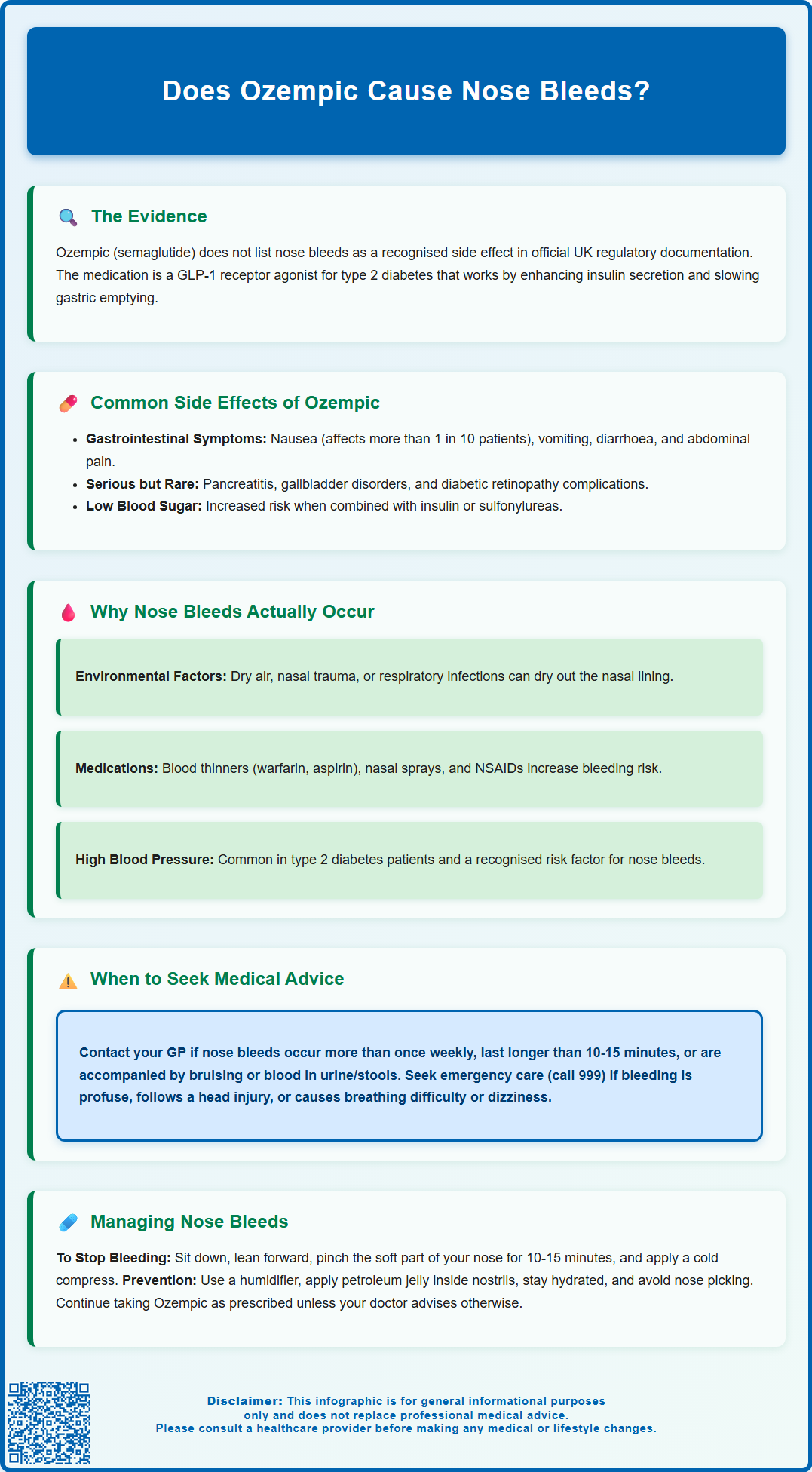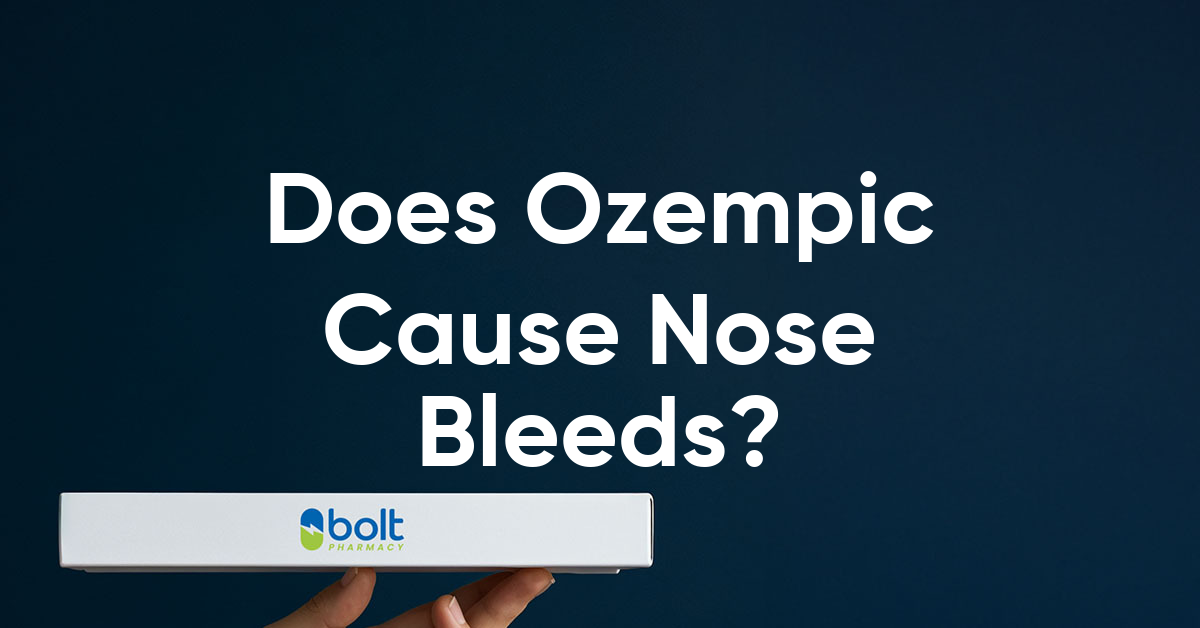Does Ozempic cause nose bleeds? This is a question some patients taking semaglutide for type 2 diabetes have raised. Currently, there is no established clinical link between Ozempic and epistaxis (nose bleeds). Nose bleeds are not listed as a recognised side effect in UK regulatory documentation from the MHRA or in the Summary of Product Characteristics. Whilst Ozempic has a well-documented side effect profile—predominantly gastrointestinal symptoms—nose bleeds have not been identified as a direct consequence of the medication. This article examines the evidence, explores alternative causes of nose bleeds in people with diabetes, and provides guidance on when to seek medical advice.
Summary: There is no established clinical link between Ozempic (semaglutide) and nose bleeds, which are not listed as a recognised side effect in UK regulatory documentation.
- Ozempic is a GLP-1 receptor agonist licensed for type 2 diabetes treatment in adults.
- The most common side effects are gastrointestinal, including nausea, vomiting, and diarrhoea.
- Nose bleeds may occur due to environmental factors, nasal trauma, anticoagulant use, hypertension, or upper respiratory infections.
- Patients taking anticoagulants or antiplatelets for cardiovascular protection may have increased bleeding tendency.
- Seek medical advice if nose bleeds are frequent, heavy, prolonged, or accompanied by other bleeding symptoms or anaemia.
- Report suspected side effects through the MHRA Yellow Card scheme and discuss concerns with your diabetes care team.
Table of Contents
Does Ozempic Cause Nose Bleeds?
There is currently no established clinical link between Ozempic (semaglutide) and nose bleeds (epistaxis) as a recognised side effect. Nose bleeds are not listed among the common, uncommon, or rare adverse reactions in the Summary of Product Characteristics (SmPC) for Ozempic approved by the Medicines and Healthcare products Regulatory Agency (MHRA). This is also true for Wegovy, the higher-dose semaglutide product licensed for weight management in the UK.
Ozempic is a glucagon-like peptide-1 (GLP-1) receptor agonist licensed for the treatment of type 2 diabetes mellitus in adults. It works by enhancing insulin secretion in response to elevated blood glucose levels, suppressing glucagon release, and slowing gastric emptying. While the medication has a well-documented side effect profile—including gastrointestinal symptoms such as nausea, vomiting, and diarrhoea—nose bleeds have not been identified as a direct pharmacological consequence of semaglutide.
It is important to recognise that correlation does not imply causation. Spontaneous reports of symptoms occurring while taking a medication do not establish that the medication caused those symptoms. Patients with type 2 diabetes may experience nose bleeds for various reasons unrelated to their medication, including environmental factors, underlying health conditions, or concurrent medications. If you are taking Ozempic and have noticed recurrent or troublesome nose bleeds, it is advisable to discuss this with your GP or diabetes specialist to identify the underlying cause and determine appropriate management. This article explores the possible reasons for nose bleeds in patients taking Ozempic and provides guidance on when to seek medical advice.

Understanding Ozempic and Its Common Side Effects
Ozempic (semaglutide) is administered as a once-weekly subcutaneous injection and is widely prescribed in the UK for glycaemic control in adults with type 2 diabetes. The medication mimics the action of the naturally occurring hormone GLP-1, which is released from the intestine in response to food intake. By binding to GLP-1 receptors on pancreatic beta cells, semaglutide stimulates insulin secretion in a glucose-dependent manner, thereby reducing blood sugar levels.
The most frequently reported side effects of Ozempic are gastrointestinal in nature. According to the MHRA-approved product information, these include:
-
Nausea (very common, affecting more than 1 in 10 patients)
-
Vomiting and diarrhoea (common, affecting up to 1 in 10 patients)
-
Abdominal pain and constipation (common)
-
Decreased appetite (common)
These gastrointestinal symptoms typically occur during the initial weeks of treatment or following dose escalation and often diminish over time as the body adjusts to the medication. Other recognised side effects include injection site reactions (uncommon), fatigue, and gallbladder disorders including cholelithiasis. Serious adverse effects include pancreatitis and diabetic retinopathy complications, particularly in patients with pre-existing retinopathy who experience rapid improvement in blood glucose control. The risk of hypoglycaemia increases when Ozempic is used in combination with insulin or sulfonylureas.
Cardiovascular benefits have been demonstrated in clinical trials (SUSTAIN-6), with semaglutide reducing the risk of major adverse cardiovascular events in patients with type 2 diabetes at high cardiovascular risk. Understanding the established side effect profile of Ozempic helps contextualise reports of symptoms—such as nose bleeds—that are not formally recognised as drug-related adverse reactions.
Why Nose Bleeds Occur: Possible Causes and Risk Factors
Nose bleeds, or epistaxis, are a common occurrence in the general population and can result from a wide range of causes. The nasal mucosa is richly vascularised and particularly vulnerable to trauma, dryness, and inflammation. Understanding the potential reasons for nose bleeds can help determine whether they are coincidental or potentially related to other factors associated with diabetes or its treatment.
Common causes of nose bleeds include:
-
Environmental factors: Dry air, particularly during winter months or in centrally heated environments, can dry out the nasal mucosa, making it more prone to bleeding.
-
Nasal trauma: Nose picking, vigorous nose blowing, or minor injuries can damage delicate blood vessels.
-
Upper respiratory tract infections: Colds, sinusitis, and allergic rhinitis can cause inflammation and congestion, increasing the likelihood of epistaxis.
-
Medications: Anticoagulants (such as warfarin, apixaban, or rivaroxaban) and antiplatelet agents (such as aspirin or clopidogrel) can increase bleeding tendency. Many patients with type 2 diabetes take these medications for cardiovascular protection.
-
Intranasal medications: Steroid nasal sprays, decongestants, and other intranasal preparations can irritate the nasal lining.
-
NSAIDs: Regular use of non-steroidal anti-inflammatory drugs may increase bleeding risk.
-
Hypertension: Poorly controlled high blood pressure is a recognised risk factor for nose bleeds and is common in patients with type 2 diabetes.
-
Other factors: Excessive alcohol consumption, liver disease affecting clotting, and continuous positive airway pressure (CPAP) therapy can all contribute to epistaxis.
There is no established evidence or pharmacological mechanism by which Ozempic would cause nose bleeds. If you experience recurrent nose bleeds, a thorough assessment by a healthcare professional is essential to identify the underlying cause.
When to Seek Medical Advice About Nose Bleeds on Ozempic
While occasional, minor nose bleeds are generally not a cause for concern, certain features warrant prompt medical evaluation. If you are taking Ozempic and experience nose bleeds, it is important to assess the frequency, severity, and associated symptoms to determine whether further investigation is needed.
You should contact your GP or healthcare provider if:
-
Nose bleeds occur frequently (more than once a week) or are becoming more common
-
Bleeding is heavy or difficult to control, lasting longer than 10-15 minutes despite applying pressure
-
You experience nose bleeds accompanied by other bleeding symptoms, such as bleeding gums, easy bruising, blood in urine or stools, or prolonged bleeding from minor cuts
-
You have symptoms of anaemia, including fatigue, pallor, shortness of breath, or dizziness
-
Nose bleeds are associated with severe headaches, visual disturbances, or neurological symptoms
-
You are taking anticoagulant or antiplatelet medications and notice a change in bleeding patterns
-
You have persistent unilateral nasal obstruction or notice a mass in the nose
Seek immediate medical attention (call 999 or attend A&E) if:
-
You experience a nose bleed following a significant head injury
-
Bleeding is profuse and uncontrollable despite applying pressure for 10-15 minutes
-
You have difficulty breathing or are swallowing large amounts of blood
-
You feel faint, dizzy, or unwell, which may indicate significant blood loss
For urgent but non-emergency situations, you can also contact NHS 111 for advice.
Your GP may perform a physical examination, review your medication list, and check your blood pressure. Blood tests may be arranged to assess your full blood count (to check for anaemia) and kidney function. If you take warfarin, your INR will be checked. In most cases, nose bleeds are benign and self-limiting, but a thorough evaluation ensures that any significant underlying pathology is not missed.
Managing Nose Bleeds While Taking Ozempic
If you experience a nose bleed while taking Ozempic, immediate first aid measures can help control the bleeding effectively. The NHS recommends the following steps:
-
Sit down and lean forward slightly (do not tilt your head back, as this can cause blood to run down the throat)
-
Pinch the soft part of your nose (just above the nostrils) firmly for at least 10–15 minutes without releasing pressure
-
Breathe through your mouth and avoid speaking, swallowing, or sniffing
-
Apply a cold compress to the bridge of your nose, which may help constrict blood vessels
-
Once bleeding has stopped, avoid blowing your nose, bending down, or strenuous activity for 24 hours
-
Avoid hot drinks and alcohol for 24 hours after a nose bleed
Preventative measures can reduce the frequency of nose bleeds, particularly if environmental factors or nasal dryness are contributing:
-
Use a humidifier in your home, especially during winter months, to maintain moisture in the air
-
Apply a thin layer of petroleum jelly or saline nasal gel inside the nostrils to keep the nasal mucosa moist
-
Avoid picking or rubbing your nose, and blow your nose gently when necessary
-
Stay well hydrated to maintain mucosal moisture
-
Discuss your medications with your GP, particularly if you take anticoagulants, antiplatelets, or nasal sprays
If nose bleeds persist despite these measures, your GP may refer you to an ear, nose, and throat (ENT) specialist for further assessment. Treatment options may include cauterisation of bleeding vessels or identification of structural abnormalities. For recurrent anterior nose bleeds, your GP might prescribe antiseptic or softening nasal creams.
It is important to continue taking Ozempic as prescribed unless advised otherwise by your healthcare provider. Do not stop or alter your diabetes medication without medical guidance, as this could adversely affect your glycaemic control. If you suspect Ozempic or any medication is causing side effects, report this through the MHRA Yellow Card scheme (yellowcard.mhra.gov.uk). Open communication with your diabetes care team ensures that any concerns are addressed promptly and that your treatment plan remains safe and effective.
Frequently Asked Questions
Is epistaxis a recognised side effect of Ozempic?
No, nose bleeds (epistaxis) are not listed as a recognised side effect in the MHRA-approved Summary of Product Characteristics for Ozempic or in clinical trial data for semaglutide.
What are the most common side effects of Ozempic?
The most common side effects of Ozempic are gastrointestinal, including nausea (very common, affecting more than 1 in 10 patients), vomiting, diarrhoea, abdominal pain, and decreased appetite.
When should I see a doctor about nose bleeds whilst taking Ozempic?
Contact your GP if nose bleeds occur frequently (more than once weekly), are heavy or prolonged, are accompanied by other bleeding symptoms or signs of anaemia, or if you take anticoagulant or antiplatelet medications. Seek immediate medical attention if bleeding is profuse and uncontrollable or follows significant head injury.
The health-related content published on this site is based on credible scientific sources and is periodically reviewed to ensure accuracy and relevance. Although we aim to reflect the most current medical knowledge, the material is meant for general education and awareness only.
The information on this site is not a substitute for professional medical advice. For any health concerns, please speak with a qualified medical professional. By using this information, you acknowledge responsibility for any decisions made and understand we are not liable for any consequences that may result.
Heading 1
Heading 2
Heading 3
Heading 4
Heading 5
Heading 6
Lorem ipsum dolor sit amet, consectetur adipiscing elit, sed do eiusmod tempor incididunt ut labore et dolore magna aliqua. Ut enim ad minim veniam, quis nostrud exercitation ullamco laboris nisi ut aliquip ex ea commodo consequat. Duis aute irure dolor in reprehenderit in voluptate velit esse cillum dolore eu fugiat nulla pariatur.
Block quote
Ordered list
- Item 1
- Item 2
- Item 3
Unordered list
- Item A
- Item B
- Item C
Bold text
Emphasis
Superscript
Subscript












